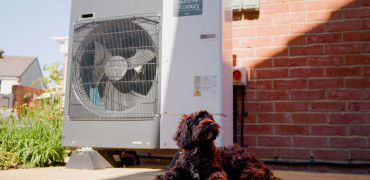As we look at ways of decarbonising our buildings on the road to net zero, Refurb Projects, Carole Titmuss looks at the work of Salford City Council which recently upgraded the heating at its Civic Centre and is now benefiting from a renewable heat pump system that has helped reduce the building’s carbon footprint by 70 tonnes, or around 54%.
Rothwell Plumbing Services Group (RPS Group) was commissioned by the Council to produce a design package to modify the heating and hot water systems to the Civic Centre in Chorley Road, Swinton.
Headquartered in Manchester, RPS Group provides a range of specialist heating, renewable & M&E services to public sector clients.
They are a specialist installer of heating solutions and one of the few who can provide a full 360-approach across projects – both regarding pre-project funding, delivery onsite, ongoing risk management/ mitigation and subsequent support post-delivery.
Decarbonising the Civic Centre saw the replacement of gas heating with CAHV heat pumps
Public Sector Decarbonisation
This site was part of £5.5M heat pump project undertaken by RPS Group for Salford City Council. The core work involved the decarbonisation and removal of gas and oil from 12 sites across the city, all run in conjunction, in a collective project that included heat pump installations to buildings of multiple purpose and use.
At the Civic Center, the company undertook the design of mechanical services from BSRIA Stage 3- 6 and the funding for the project came from the Public Sector Decarbonisation Scheme (PSDS1), after Greater Manchester Combined Authority secured funds from public funding body Salix Finance, which sees councils and other public bodies bid on an annual basis for money that must be used to reduce carbon in the built environment.
The funding was provided to Greater Manchester to support energy efficiency upgrades to buildings across the region with Salford receiving £7.454 million. The focus was to remove and replace gas systems and oil boilers reaching their end of life with heat pump systems.
Close working relationship
“RPS worked closely with Salford City Council to ensure successful delivery as the project was considered high risk as they hadn’t previously installed this technology type,” explained Sarah Rothwell, Bid Manager at RPS Group.
“It was important we developed a close working relationship as installation of the heat pumps was complex and required careful planning due to the building purposes and use.
“We’ve worked on over 14 of these types of projects now with Salford City Council to help them reduce the carbon emissions from their buildings.”
A sustainable estate
Salford Civic Centre is the administrative headquarters of the City Council, housing the council chamber and four committee rooms, alongside the Mayor's Parlour, councillors' facilities and a number of administrative offices, a registry office and spaces for public events such as weddings and civil partnerships.
“We are looking to make our entire public estate more sustainable as we work towards our stated goal of reaching carbon neutrality by 2038,” explained Councillor Mike McCusker, Lead Member for Planning, Transport and Sustainable Development.
“Council officers worked closely with RPS Group to ensure that the centre can now be heated from renewable heat pumps. Removing gas from the centre was a key priority and it had to be done in a way that retained the look and feel of this historic building and RPS Group were very professional throughout the project.”
Heat pumps replace gas
Decarbonising the Civic Centre saw the removal of the old gas-fired heating plant and the gas-fired water heater and their replacement with 11 Mitsubishi Electric CAHV air source heat pumps.
The CAHV heat pumps are ideally suited to this application as they offer a robust, low carbon system for the provision of sanitary hot water and space heating. The air source heat pumps can operate as a single system or, as in the case of the Civic Centre, form part of a multiple unit system, making it suitable for most commercial applications.
The CAHV offers capacities from 43kW to 688kW and delivers water flow temperatures of 25°C to 70°C without boost heaters, although in this instance RPS Group also installed an HRS Aquasave ASE hot water generator as back up.
“We worked with RPS Group on the design and commissioning elements using the CAHV,” explained Tom Bowland, M&E Contractor Sales Manager for Northern England at Mitsubishi Electric. “The other benefit of the CAHV heat pump is that a multi-unit system can cascade power from available units in half kilowatt increments to meet the load of the building, so that it only consumes the energy needed at any given time”.
Cast iron radiators
In addition to replacing the heating and hot water plant, RPS Group installed trace-heated primary circuit distribution LPHW (low temperature) pipework from the heat pumps to the existing plantroom.
Other work included a pressurisation unit and expansion vessel, dosing pot, air and dirt separator and primary and secondary circulating pumps and new distribution and pipework. New primary, secondary and DHWS (Direct Hot Water) heat pressurisation systems and expansion vessels were also installed.
RPS Group upgraded electricity connection to support minimum loads of 460kw, which included a new main switchboard. They also refurbished over 200 existing column pattern cast iron radiators replacing TRV & LSV’s and re-piping the system.
Salford Civic Centre was originally built in 1937 and its most striking feature was the 38m tall multi-faced clock tower. With the installation of renewable heating generations of people using the centre may well be struck by just how low carbon the heating system is.
Carole Titmuss is publisher and editor of Refurb Projects magazine




